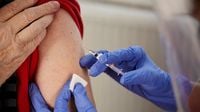A recent study published in the European Heart Journal has revealed that the shingles vaccine significantly lowers the risk of heart disease, including heart attacks and strokes, for up to eight years. Conducted by researchers from Kyung Hee University in South Korea, this extensive study analyzed over a million medical records, providing compelling evidence of the vaccine's broader health benefits.
The research found that individuals who received the shingles vaccine had a 23% lower risk of cardiovascular events, which encompass serious conditions like heart attacks, strokes, and heart failure. This protective effect is particularly pronounced among men, younger individuals under the age of 60, and those with unhealthy lifestyle habits such as smoking, excessive alcohol consumption, and inactivity.
Professor Dong Keon Yon, who led the study, noted, "Shingles causes a painful rash and can lead to serious complications, especially in older adults and those with weak immune systems. Previous research shows that, without vaccination, about 30% of people may develop shingles in their lifetime. In addition to the rash, shingles has been linked to a higher risk of heart problems, so we wanted to find out if getting vaccinated could lower this risk." The study included 1,271,922 participants aged 50 and older, providing a comprehensive overview of the health impacts of the shingles vaccine.
Researchers gathered data from 2012 onward, tracking vaccination status and cardiovascular health outcomes among the participants. The vaccine used in the study was a live zoster vaccine, which contains a weakened form of the varicella zoster virus that causes shingles. However, many countries, including the United States, are transitioning to a non-live recombinant vaccine known as Shingrix, which has been shown to be more than 90% effective in preventing shingles.
The study results indicate that the protective effects of the shingles vaccine are strongest in the first two to three years post-vaccination, but they persist for up to eight years. Specifically, the findings revealed a 26% lower risk of major cardiovascular events, a 26% lower risk of heart failure, and a 22% lower risk of coronary heart disease among vaccinated individuals.
Professor Yon explained, "There are several reasons why the shingles vaccine may help reduce heart disease. A shingles infection can cause blood vessel damage, inflammation, and clot formation that can lead to heart disease. By preventing shingles, vaccination may lower these risks. Our study found stronger benefits in younger people, probably due to a better immune response, and in men, possibly due to differences in vaccine effectiveness." This research underscores the potential of the shingles vaccine as a public health tool, not just for preventing shingles but also for reducing the risk of serious cardiovascular conditions.
However, the study also comes with caveats. As it is based on an Asian population, the results may not be universally applicable to all demographics. Additionally, while the findings are promising, they do not establish a direct causal relationship between vaccination and reduced heart disease risk, indicating that further research is needed.
The implications of this study are significant, especially considering the rising prevalence of cardiovascular diseases globally. Vaccination against shingles could be a proactive measure not only in preventing the painful condition itself but also in promoting long-term heart health. Given the vaccine's established safety profile and the fact that it is widely covered by health insurance, public health officials may want to emphasize its broader benefits.
Moreover, a previous study published in Nature Medicine found that the shingles vaccine could also delay the onset of dementia, providing yet another reason for individuals to consider vaccination. As Dr. Céline Gounder, a medical contributor, pointed out, "The fact that we have a vaccine that's already approved, already out there, covered by insurance, and super easy to get is really promising for a lot of people."
Currently, the Centers for Disease Control and Prevention (CDC) recommends that everyone over the age of 50 receive the shingles vaccine. This recommendation is particularly important as the risk of developing shingles increases with age, especially in individuals who have previously had chickenpox, as the varicella zoster virus remains dormant in their bodies.
In conclusion, the findings from this large-scale study highlight the shingles vaccine as a critical component of preventive healthcare, potentially offering significant benefits beyond shingles prevention. As researchers continue to explore the impacts of both the live zoster vaccine and its recombinant counterpart, the Shingrix vaccine, the hope is to solidify the role of vaccination in safeguarding not just against shingles, but also against serious cardiovascular diseases.






